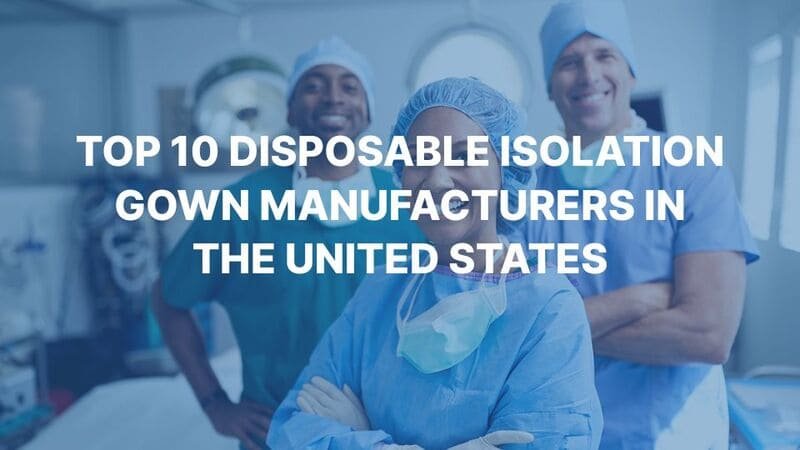Table of Contents
Plastic lab coats are widely used in medical, laboratory, and food industry settings. They provide a lightweight, waterproof barrier against contaminants, chemical splashes, and harmful particles. Plastic lab coats are disposable, they can minimize cross-contamination risks in situations that demand frequent changes, such as healthcare or food processing.
In this article we will offer a step-by-step guide for buyers to place bulk orders for plastic lab coats. From understanding the types and benefits of plastic lab coats to selecting the right supplier and ensuring quality.
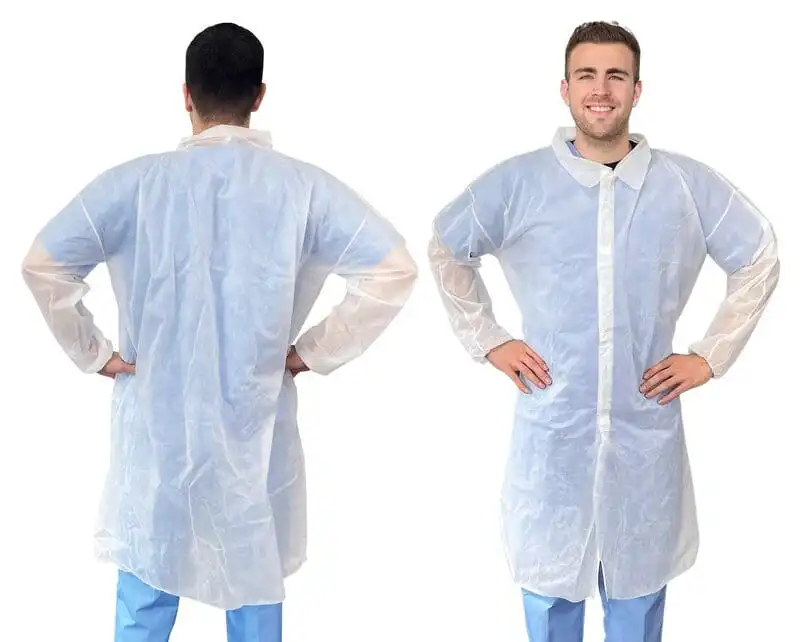
What are Plastic Lab Coats?
Plastic lab coats, mostly referred to as disposable lab coats, are made from various non-woven materials like polypropylene, SMS (spunbond-meltblown-spunbond) nonwoven, and microporous film.
Types of Plastic Lab Coats
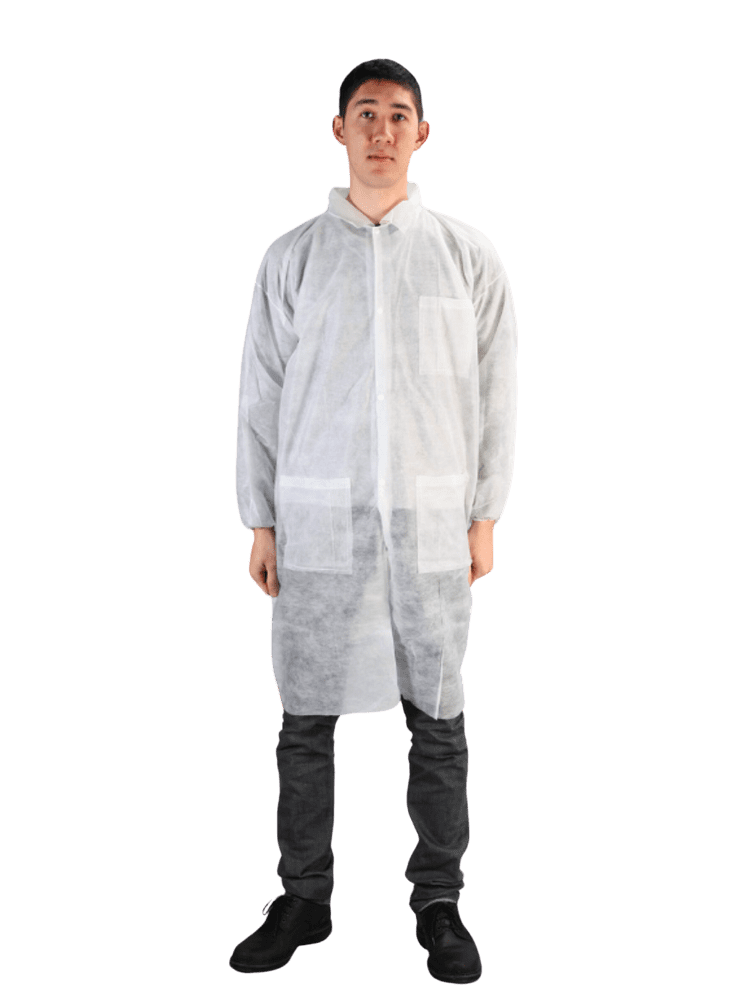
- Polypropylene Lab Coats are light and let air through, block dry particles, and are affordable. Many labs use them.
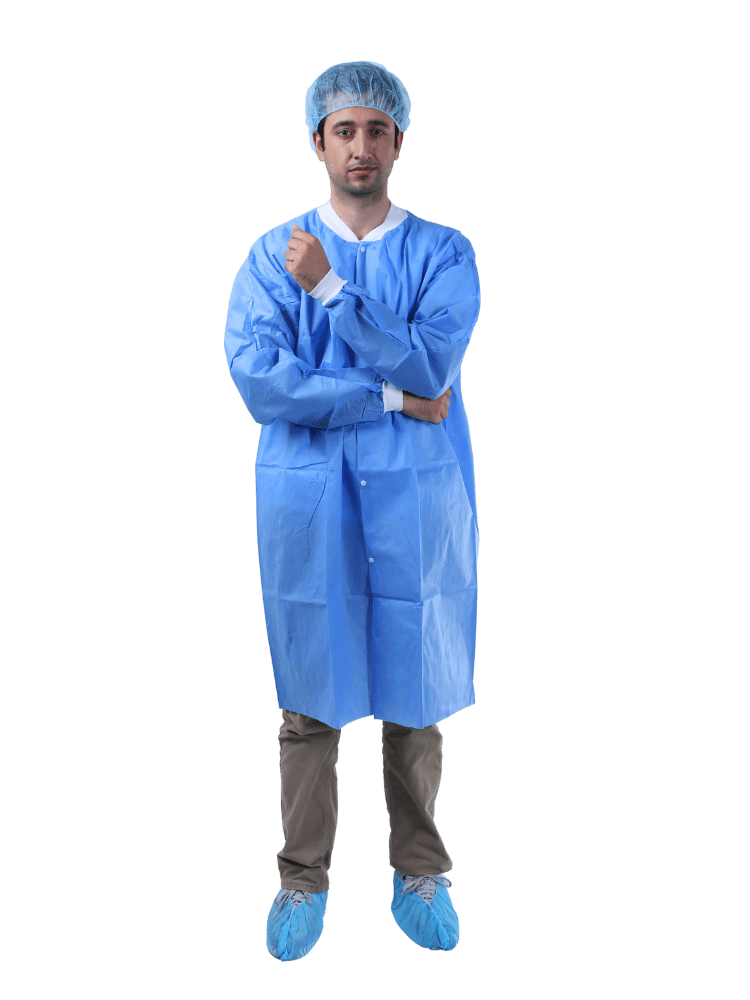
- SMS Nonwoven Lab Coats resist fluids well, great for labs that deal with body fluids or water-based liquids.
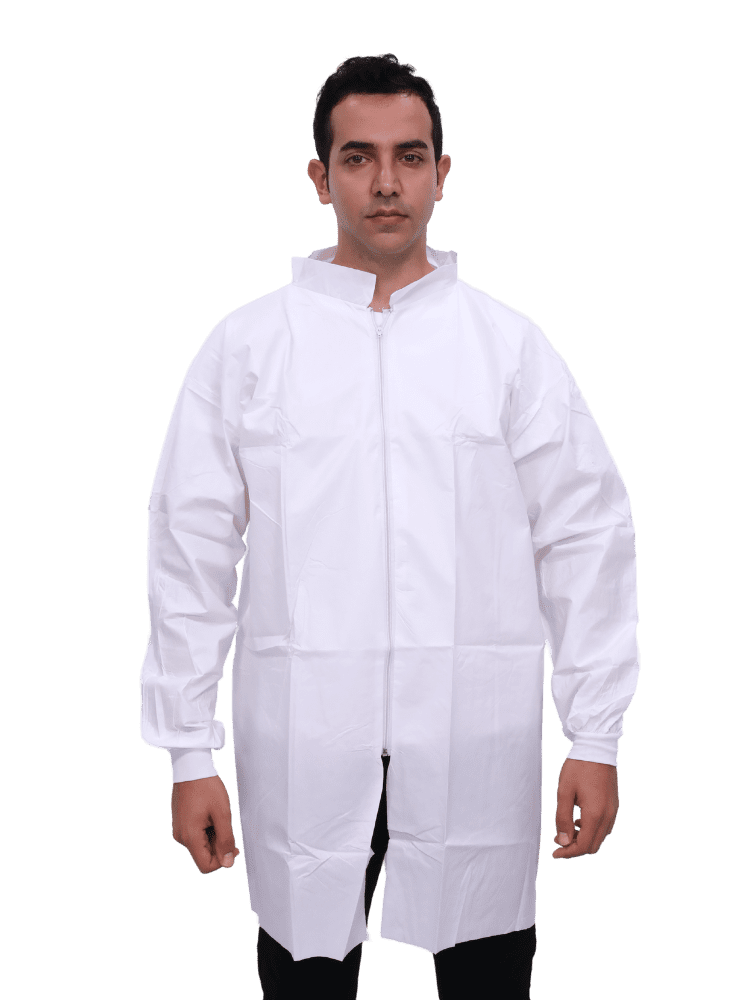
- Microporous Lab Coats have a microporous film coated on a polypropylene base. They provide a waterproof barrier and protect against small dangerous particles or chemicals.

- Plastic lab coats sometimes refer specifically to disposable lab coats made of plastic material, such as Polyethylene.
Why Use Plastic Lab Coats?
- Prevent Cross-Contamination: Plastic lab coats act as a primary barrier to stop cross-contamination and protect against contagious substances.
- Protection from Chemical Spills and Splashes: They shield skin and clothes from chemical spills and splashes.
- Protection from Dry Particulates: These coats protect against harmful dust and dry particles.
- Affordable: They are usually cheaper than reusable lab coats, making them cost-effective.
- Reduced Maintenance Costs: As disposable items, plastic lab coats save on laundry and maintenance expenses.

Step By Step Guide Bulk Ordering Plastic Lab Coats
1. Assess Your Needs
When planning a bulk order for plastic lab coats, think about these factors:
- Usage Frequency: Work out how often lab coats are used and count the number of employees to determine the order size.
- Environmental Factors: Look at the specific risks in your lab to select the right features.
- Required Features: Make sure the lab coats match your needs, like color, size, and safety features.
- Try Before Buying: Ask for samples to check if they meet safety, comfort, and durability standards before placing a large order.
2. Identifying Use Scenario for Bulk Ordering Plastic Lab Coats
Plastic lab coats are crucial in various fields for maintaining safety and hygiene when facing contamination risks. Understanding their specific uses can help you make better bulk ordering choices.
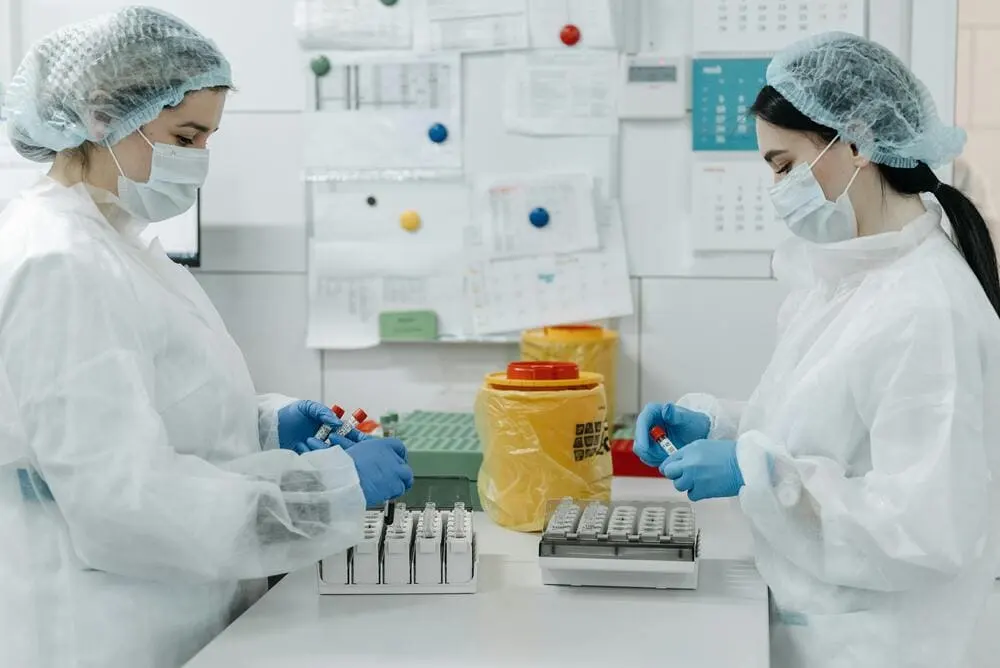
Healthcare: In healthcare, plastic lab coats help stop the spread of infectious diseases. They’re vital in places with contagious illnesses or medical procedures involving bodily fluids, ensuring healthcare workers stay protected and keep contamination at bay.

Research Laboratories: Labs that handle biological agents, hazardous chemicals, or other risky materials need plastic lab coats to prevent contamination and spills. These coats are especially important in BSL-2 labs and higher, providing extra protection for researchers and staff.
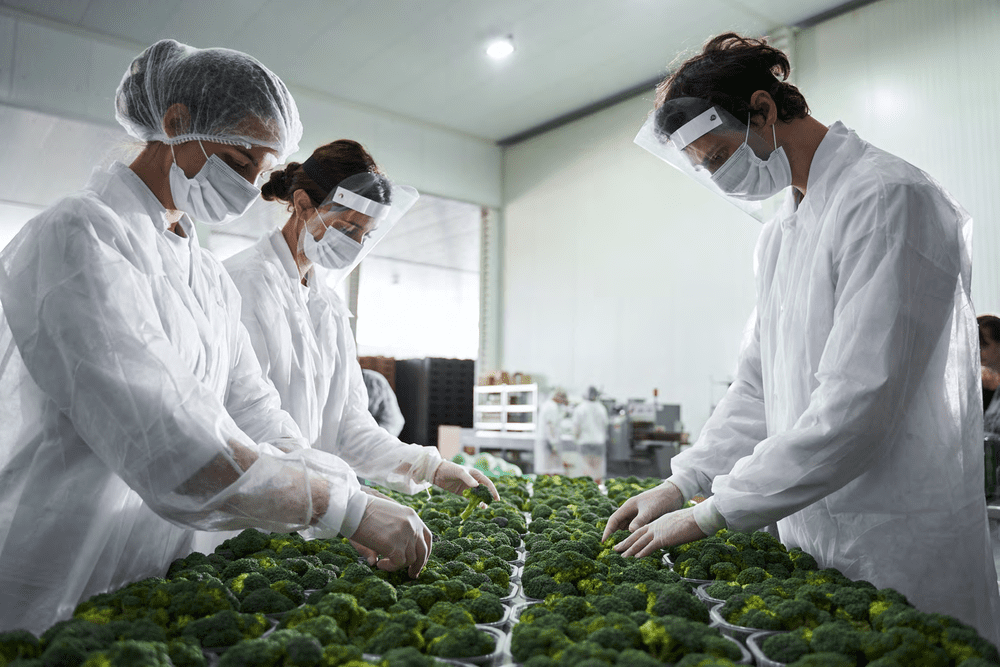
Food Industries: In food processing and preparation, plastic lab coats are essential for preventing cross-contamination and maintaining hygiene. Being disposable, they are perfect for jobs requiring frequent changes, ensuring a clean and safe working environment.
3. Estimating Quantity and Sizes for Bulk Orders
- Staff Count: Calculate how many staff members need lab coats. Include all staff in environments where lab coats are necessary.
- Usage Frequency: Determine how often lab coats will be used. If they are single-use, estimate daily or weekly needs.
- Contamination Risk: Assess the contamination risk in your lab. High-risk areas may require more frequent coat changes.
- Size Variability: Offer a range of sizes for comfort, including Small, Medium, Large, and Extra Large.
- Comfort and Compliance: Choose the right sizes for comfort and to meet regulations. Badly fitting coats can affect safety and productivity.
- Sampling: Before placing a large order, request samples of various sizes to ensure they fit well and are durable.
4. Finding Reliable Suppliers
When looking for dependable suppliers for bulk plastic lab coats, consider these factors:
- Industry Experience: Pick suppliers with extensive industry experience. For instance, Morntrip has twenty years of PPE experience, ensuring they produce quality lab coats.
- Certifications and Compliance: Check that suppliers have necessary certifications like ISO standards or FDA approvals to guarantee quality and safety.
- Customer Reviews: Look into feedback and ratings to gain insights into product quality and supplier dependability.
- Customer Service: Focus on suppliers with a straightforward ordering process, quick shipping, and prompt issue resolution.
- Supply Chain Reliability: Ensure the supplier maintains a reliable supply chain to avoid delays and guarantee timely delivery.
5. Comparing Product Quality
- Durability and Resistance: Pick lab coats made from strong materials like polypropylene or polyethylene. These resist liquids, protecting you from chemical or biofluid spills.
- Chemical Resistance: Check that the coats resist chemicals commonly used in your lab. Review supplier specs and certifications.
- Closures and Fasteners: Opt for lab coats with easy-to-use closures like snaps or Velcro.
- Elastic Wrists: Make sure the coats have elastic wrists to block contaminants.
- Sampling Before Purchase: Ask for samples to ensure the lab coats meet your needs for safety, comfort, and durability.
6. Placing Your Bulk Order for Plastic Lab Coats
Selecting a single reliable supplier can simplify the process of ordering plastic lab coats. Working with one supplier ensures consistent quality, better pricing for large orders, and streamlined customer service, making it easier to resolve issues and manage orders efficiently.
Additionally, confirming all product details is crucial. Choose the material that suits your needs, such as SMS or microporous material, and determine the exact quantity required to prevent over- or understocking. Make sure the sizes are appropriate for all users, with options like knit, open, or elastic wrists.
Finally, confirm lead times and shipping options with the supplier. Verify the supplier’s delivery schedules, choose a suitable shipping method, and confirm expected delivery dates to avoid any disruptions.
7. Quality Assurance Upon Receipt
- Inspect Packaging: Look for damage or tampering and make sure it is sealed well.
- Verify Quantity: Check if the received quantity matches what you ordered.
- Check for Visible Defects: Search for tears, holes, or weak stitching.
- Material Quality: Confirm the material meets specifications and is free from contamination.
- Labeling and Marking: Ensure proper labels include size, material, and safety information.
- Functional Check: Test zippers, Velcro, and elastic wrists to ensure they work correctly.
- Batch Testing: Randomly test samples for durability, chemical resistance, and ease of removal.
- Notify Supplier: Quickly report any problems to the supplier.
Establishing Long-Term Relationships with Suppliers
Long-term business relations with reliable suppliers are advantageous in securing the supply of plastic lab coats in bulk:
- Saves on costs and time, cause you don’t have to look for new suppliers and negotiate prices every time.
- Guarantee that materials will be available at all times for quantity and quality purposes, minimizing delays and disruptions.
- Strong relationships improve efficiency, as clear communication with the supplier simplifies order management and helps resolve any issues quickly.
- A long-term relationship with a reliable supplier can simplify your supply chain: Consolidating orders and simplifying budgeting and planning.
It’s important to maintain open and transparent communication if you want to build a long relationship with a supplier. Regular updates on demand changes or lead times help both parties avoid inventory issues. Consistent communication—via virtual meetings if necessary—also fosters a deeper understanding of each other’s business needs.
Timely payments are also essential for establishing a reliable relationship with plastic lab coats, it reinforces trust and strengthens the supplier relationship over time.
In conclusion, understanding the types of plastic lab coats, opting for a reliable supplier and doing a thorough quality check help streamline your purchase process and deliver high-quality lab coats as per your specifications at regular intervals. This guarantees long-term relationships that facilitate maximum efficiency and minimize costs.
If you are looking to purchase plastic lab coats, please contact Morntrip, a 20 years manufacturer of PPE supplies. Our professional sales team is ready to help you with every aspect of your bulk plastic lab coat order, and, to do so, we offer free samples to let you test the product before the whole cooperation. Email us today, get free samples right now.



